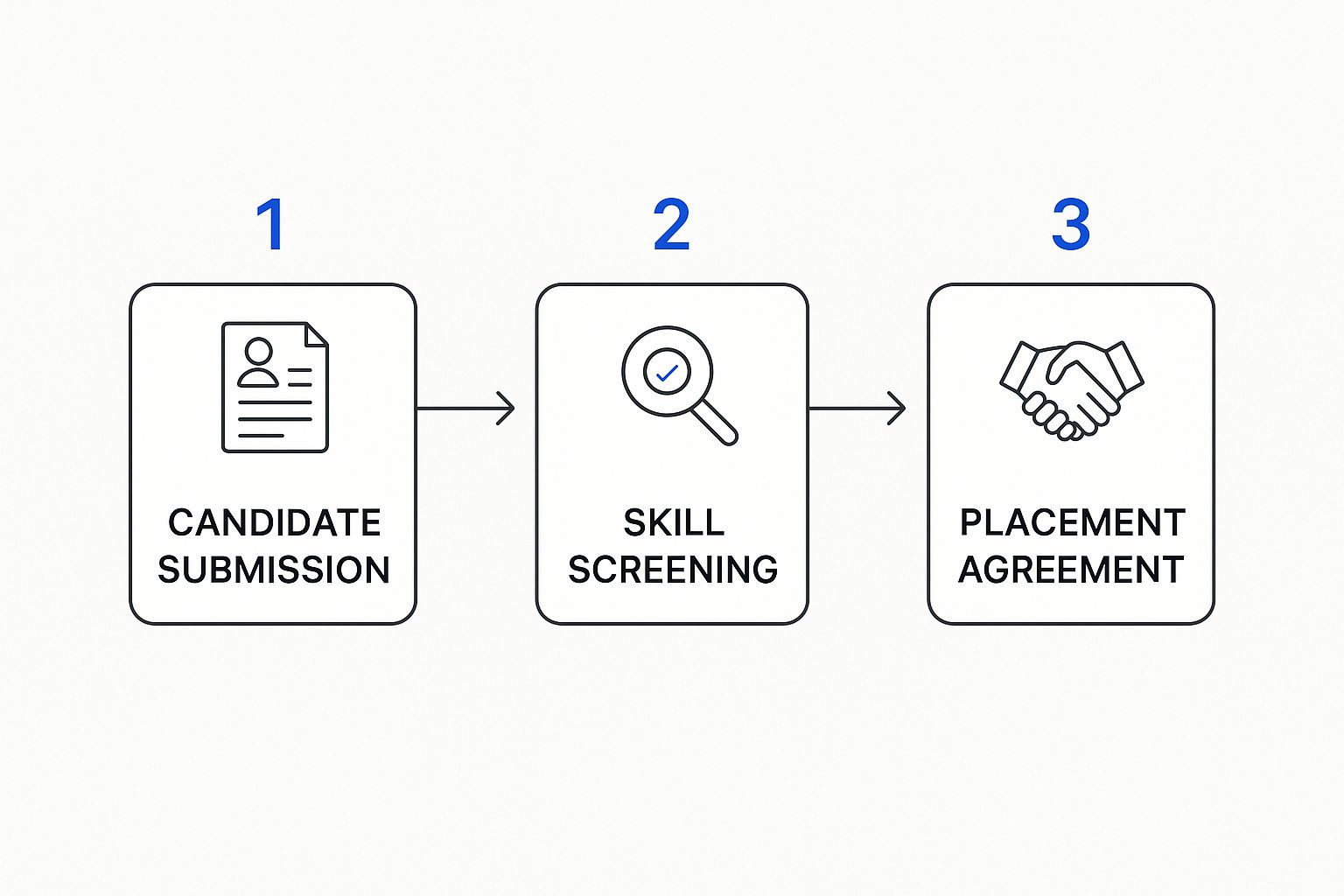Put simply, staffing agencies for accountants are specialist matchmakers. They connect businesses like yours with pre-vetted financial professionals for all sorts of roles—temporary, contract, or permanent. Think of them as a strategic partner, helping you quickly find everyone from a meticulous bookkeeper to a seasoned financial controller, which saves a ton of time and cuts down on hiring risks.
Navigating the Current Accounting Talent Market

Before you even start talking to staffing agencies for accountants, you need a clear picture of the market you're stepping into. The UK's accountancy job market is a tricky beast right now, shaped by the broader economy. The old method of just posting a job ad and waiting for the perfect person to apply? That's not a strategy you can rely on anymore.
The recent economic instability has really shaken things up. According to The Accountancy & Finance Job Market report, total UK job vacancies have shrunk dramatically, falling from a peak of around 1.3 million to just 700,000 over three years. The finance sector hasn't been immune to this, with fewer roles available for qualified accountants.
Now, you might look at that data and think it's an employer's market. But that's not the full story. While the total number of vacancies has dropped, the demand for very specific, high-level skills has done anything but.
The Paradox: High Demand in a Shrinking Market
This market slowdown hasn't hit all roles equally. In fact, for certain specialists, the competition is more intense than it's ever been. This creates a really challenging situation where you might get plenty of applicants for a generalist role, but finding a true expert requires a much more focused search. This is exactly where a specialist agency proves its worth.
So, where is the demand still white-hot?
- Management Accounting: Businesses are desperate for professionals who can turn raw financial data into sharp, strategic insights.
- Business Partnering: Companies need accountants who can get out of the finance department and work alongside other teams to really drive performance.
- Financial Control: With regulations getting tighter, experienced financial controllers who can manage risk and ensure rock-solid compliance are absolutely essential.
The best recruitment strategies are always grounded in reality. Once you accept that top-tier, specialised talent is still hard to find, you can set realistic goals and find an agency that has the connections to actually deliver.
How the Best Agencies Are Staying Ahead
The top staffing agencies aren't just sitting back and waiting for CVs to roll in. They’ve changed their tactics to meet these new market challenges head-on.
Their secret is cultivating deep, specialised talent pools. Instead of starting from square one every time a client has a vacancy, they're constantly building relationships with a network of pre-vetted candidates. Many of these professionals are 'passive'—they aren't actively scrolling through job boards but are open to the right opportunity. This proactive approach is what allows them to find exceptional accountants who can step in and make a difference from day one.
Defining What Your Business Actually Needs

Before you can get the best from a specialist accounting recruitment agency, you have to get specific. Simply asking for a "Financial Accountant" is like telling a builder you want "a house" without handing them a blueprint. You'll get something, sure, but it almost certainly won't be what you had in mind. A solid partnership with a recruiter begins with a crystal-clear brief.
So, where do you start? First, pin down the actual scope of the role. Are you after a permanent team member to grow with the company, someone to cover a three-month maternity leave, or an expert contractor for a single project? Each scenario demands a completely different candidate profile.
- Permanent Hire: Here, you’re looking for someone who will buy into your company culture and contribute to its long-term journey.
- Temporary Cover: The focus shifts entirely to immediate impact. You need someone with the right skills to hit the ground running and manage a specific workload for a set period.
- Contract-to-Hire: This is a great way to "try before you buy." It gives you a crucial trial period to see their skills and personality in action before you commit to a permanent offer.
Distinguishing Must-Haves from Nice-to-Haves
Once you’ve settled on the employment type, it’s time to separate the absolute essentials from the 'nice-to-have' skills. It’s tempting to create an endless wish list, but that only confuses the search. Be ruthless.
For instance, if you're hiring a Management Accountant, perhaps proficiency in Power BI for creating dashboards is a non-negotiable must-have. On the other hand, experience in your specific niche, while a bonus, could be a nice-to-have that a sharp candidate could learn on the job.
This is also where you need to list the specific tools and platforms they'll be using day-to-day. Don't forget anything – from your core ERP system to the multi-currency accounting software solutions you rely on for international trade. This detail helps the agency find someone who can start adding value from day one.
A detailed brief doesn't just help the agency; it forces you to clarify your own expectations. This internal alignment is the bedrock of a successful hire and prevents costly misunderstandings down the line.
To help you structure this process, use a framework to document exactly what you need. This ensures nothing is missed and gives your staffing partner a comprehensive brief to work from.
Defining Your Accounting Role Requirements
A framework to help you detail the specific needs for your next accounting hire, ensuring clarity for potential staffing partners.
Thinking through these categories forces a level of detail that makes all the difference.
Finally, think about the person behind the CV. What kind of individual will actually succeed in your company's environment? A fast-paced tech start-up that’s building everything from scratch requires a very different personality to a well-established manufacturing firm with rigid processes. Defining the cultural fit is just as important as the technical skills, so give your agency partner the full picture.
How to Shortlist the Right Specialist Agencies
With your detailed brief in hand, you’re ready to find the right recruitment partner. But how do you cut through the noise? In a crowded market, it's tough to separate genuine specialists from generalists who just happen to have a finance section on their website.
The secret is to look past the slick marketing and dig into their actual process and expertise. A true specialist won't just match keywords on a CV; they live and breathe the accounting world and understand its unique demands.
Your initial search for staffing agencies for accountants will probably throw up a long list. Start filtering it down by looking for clear, undeniable proof of specialisation. The best firms focus exclusively, or at least predominantly, on finance and accounting roles. Their website, case studies, and even the language on their consultant profiles should scream finance.
Evaluating Industry Expertise and Reach
Once you have a manageable list, it’s time to gauge their depth of knowledge. A top-tier agency gets the specific challenges of your sector. For instance, hiring a project accountant for a major infrastructure build requires a completely different skillset than finding a finance manager for a fast-growing tech start-up.
This is more important than ever right now. The finance jobs market recently saw a 17% surge in recruitment as businesses rushed to strengthen their teams. We saw major players like Network Rail and Babcock increase their finance hiring by a staggering 68% and 94% respectively, all driven by huge infrastructure and defence contracts. A specialist agency knows exactly what kind of financial minds thrive in those environments. A generalist firm simply won't.
Don’t just be impressed by a big brand name. A smaller, niche firm with deep roots in the accounting community often delivers far better results because their network is incredibly focused and relevant.
As you start shortlisting and talking to agencies, thinking about the principles of effective vendor management best practices can give you a solid framework for how you evaluate them and manage the relationship long-term.
Asking the Right Questions
That first call is your real opportunity to vet potential partners. Forget their sales pitch; you need to ask pointed questions that get to the heart of how they actually work. Their answers will tell you everything.
Here are a few sharp questions to get you started:
- Candidate Sourcing: "Beyond LinkedIn and job boards, where do you find the high-calibre candidates who aren't actively looking for a new role?"
- Vetting Process: "Can you walk me through your technical screening process for, say, an ACCA-qualified accountant?"
- Recent Placements: "Tell me about a similar role you've filled within our industry in the last six months."
This kind of workflow is what you should expect from a professional agency.

As you can see, a structured, transparent process—from initial brief to final agreement—is the bedrock of a successful placement. It’s what separates the pros from the chancers.
Finally, a huge part of your decision comes down to how they collaborate. For more on this, our guide on https://www.beyondhire.co/blog/how-to-work-with-recruitment-agencies offers a deeper dive into building that partnership. Pay close attention to their communication style and how they plan to keep you updated. You're looking for a strategic partner, not just a CV delivery service.
Running an Interview Process That Reveals True Talent

So, your chosen staffing agency has delivered a shortlist of promising accountants. Now, the ball is firmly in your court. A polished CV gets a candidate through the door, but the interview is where you’ll find out if they can truly elevate your finance team.
This is your chance to see how they think on their feet, solve problems, and communicate when the pressure is on. It’s about much more than just ticking off technical skills.
If you rely on stale questions like "What are your greatest strengths?", you'll just get tired, rehearsed answers. To get a real sense of their abilities, you need to dig deeper. The aim is to move beyond what they claim they can do and see hard evidence of what they’ve actually done.
Go Beyond the CV with Real-World Scenarios
The best way to test an accountant's mettle is to throw them a realistic challenge they’d likely face in your business. This simple technique quickly separates the theorists from the seasoned practitioners who have been in the trenches.
Try tailoring questions to the specific role you're hiring for.
- For a Management Accountant: "Our sales director has just pitched a new product launch, but the financial model feels a bit… optimistic. Talk me through how you’d critique their assumptions and what your presentation to the leadership team would look like."
- For a Financial Controller: "It's two days before month-end, and you've found a major discrepancy in revenue recognition that could materially affect our earnings. What are your first three moves, and who do you pull into the room?"
- For a Bookkeeper: "You’ve spotted that we've paid a few large invoices from a key supplier twice over the last quarter. How would you investigate this, and what process would you put in place to stop it from happening again?"
There isn't a single correct answer to these questions. What you're really listening for is their thought process, their problem-solving instincts, and how clearly they can articulate a plan.
A candidate's ability to walk you through a logical plan for a tricky situation tells you more than a CV ever could. It’s a direct window into how they'll perform when a real crisis hits.
Involve Your Team to Get the Full Picture
Hiring in a silo is a mistake I’ve seen many businesses make. The only way to truly gauge how someone will fit into your team is to involve the people they’ll be working with every day.
This doesn't mean you need a ten-person panel interview. It’s about being strategic. Your Head of Finance could handle the deep technical dive, while a future colleague from the accounts team could have a more informal chat about workflow and collaboration. This approach gives you a much more rounded, holistic view of the candidate and flags any potential personality clashes early on.
Give Your Agency Feedback That Actually Helps
Your partnership with the recruitment agency is a two-way street, and it doesn't stop once interviews begin. After you’ve spoken to each candidate, give your recruiter detailed, constructive feedback.
Vague notes like "not a good fit" are completely unhelpful. You need to be specific.
- Instead of "not a good fit," try: "Candidate A was technically brilliant, but they really struggled to explain complex financial ideas in a simple way for the non-finance managers they’d be working with."
- Instead of "lacked experience," try: "Candidate B was an excellent communicator, but they have no hands-on experience with our ERP system, which is a deal-breaker for us."
This level of detail is gold dust for your recruiter. It helps them fine-tune their search and ensures the next batch of candidates is even closer to what you need, turning them from a supplier into a true strategic partner.
From Offer to Onboarding a New Team Member
https://www.youtube.com/embed/F2FAWk8DJ3U
That ‘yes’ from your top candidate feels like crossing the finish line, but in reality, it’s just the start of the final, crucial lap. The period between offer acceptance and the first day is where a great hiring process can either solidify or fall apart. Now it's all about making the partnership official and paving the way for a successful start.
First things first, you and your chosen agency need to get the commercial terms ironed out. In the UK, most specialist staffing agencies for accountants work on one of two models:
- Contingency Search: This is the most common approach for junior to mid-level roles. Simple and effective, you only pay the agency's fee after their candidate has formally accepted your job offer.
- Retained Search: You pay a portion of the fee upfront. This secures the agency's dedicated, focused effort, making it the go-to model for senior leadership, executive, or highly specialised roles where finding the right person is a serious challenge.
The current market definitely has a say in which model works best. While permanent placements have seen a bit of a dip, temporary staffing is holding incredibly strong, making up around 75% of the market value. This tells us that businesses are prioritising flexibility. For you, it means ensuring your partner agency has the financial stability and tech backbone to manage a deep pool of temporary finance talent.
Finalising the Agreement and Planning for Day One
With the fee structure sorted, it’s time to get into the details of the service level agreement (SLA). Don't just skim this document; it's your safety net. The most important thing to look for is a clear rebate period or a free replacement guarantee. This clause protects your investment if the new hire doesn't work out and leaves within the first three to six months.
Once the ink is dry on the paperwork, your attention needs to pivot immediately to onboarding. A chaotic, disorganised first few weeks can completely undermine all the effort you’ve invested. The aim here is simple: make your new accountant feel welcomed, fully equipped, and ready to make a real contribution from the get-go. After extending an offer, an efficient onboarding workflow is key to getting new starters up to speed. For a closer look at improving these internal systems, you might find some useful ideas in this guide on business process optimization.
A world-class onboarding experience is your final sales pitch. It reassures your new hire that they made the right choice and lays the foundation for their long-term retention and success.
The best way to guarantee a smooth start is by creating a detailed onboarding checklist specifically for an accounting role. Think beyond the usual HR paperwork and IT setup. What software do they need access to? Who are the key people they need to meet in their first week? For more on building a great welcome, have a look at our guide to employee onboarding best practices. This is how you turn a good hire into a genuinely indispensable part of your team.
Frequently Asked Questions

If you're thinking about bringing in a recruitment agency to find your next accountant, it’s completely normal to have a few questions. Let's tackle some of the most common ones we hear from UK businesses, so you can make your decision with total confidence.
What Is the Typical Fee for an Accounting Recruitment Agency in the UK?
You’ll find most agencies in the UK work on a contingency basis. What does that mean for you? Simple: you don’t pay a penny until they’ve found the right person and that person has accepted your job offer. The fee is then calculated as a percentage of the candidate's first-year salary.
For more senior or highly specialised roles, some firms might propose a retained search. This involves paying a portion of the fee upfront, which secures their dedicated, exclusive focus on filling your critical vacancy.
And for temporary staff? The model changes. You're typically billed an hourly or daily rate that covers the temp's wages plus the agency's margin for handling all the payroll and admin.
How Long Does It Usually Take to Hire an Accountant?
The timeline really depends on the role. For a fairly standard position, like a Financial Accountant, a sharp agency can get a shortlist of excellent candidates in front of you within a week or two. It can be that fast.
From your very first chat with the agency to your new hire walking through the door, the whole process usually takes somewhere between four and eight weeks. That buffer allows for a proper interview process and, crucially, the candidate’s notice period at their old job.
While getting someone in quickly is great, the real win is finding the right person who will stick around and add value. A good agency’s priority is the quality of the hire, not just filling the vacancy. This focus on the right long-term fit saves you from the headache and expense of a bad hire down the line.
What if a Candidate Leaves Soon After Starting?
It’s a fair question and a big worry for many businesses. The good news is that any reputable agency has a plan for this. They'll offer what's known as a rebate period or a free replacement guarantee.
This clause, which should be crystal clear in your contract, is your safety net. If your new hire decides to leave within a set period (usually three to six months), the agency steps back in. They'll either find you a new candidate at no extra charge or refund a portion of their fee. Always make sure you understand these terms before you sign anything.
Should I Use a Generalist or a Specialist Finance Agency?
When it comes to finance and accounting, a specialist agency is almost always the better bet. Generalist recruiters might cast a wide net, but they lack the deep-water knowledge you really need.
A dedicated finance recruiter lives and breathes the industry. They understand the difference between ACCA, CIMA, and ACA qualifications and can properly vet technical skills. More importantly, they have a ready-made network of high-calibre professionals—many of whom aren't even actively looking for a new job. This insider knowledge results in a smarter search, better candidates, and a hire that truly strengthens your team.

